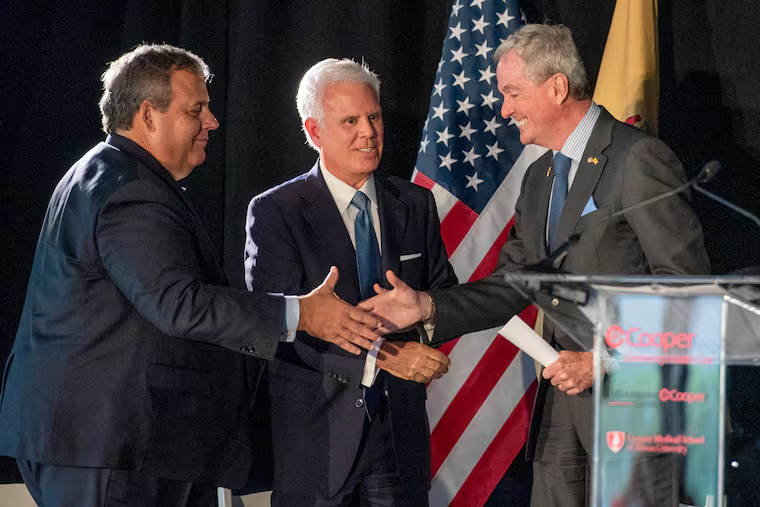George Norcross gains power at Republic Bank in $75 million truce
A fundraising truce in the two-year fight for Philly's troubled Republic Bank paves a path for South Jersey power broker George Norcross III and his family and allies to take it over.

A pact between ailing Republic First Bancorp Inc. and rebel shareholders led by South Jersey business and political power broker George E. Norcross III is designed to raise needed cash, replace most of the board, and end a costly struggle for control of the largest bank still based in Philadelphia.
Under the agreement, announced Wednesday night, a group including Norcross; his children, Lexie and Alex; his lawyer brother Philip; and ex-TD Bank executive Gregory B. Braca agreed to invest at least $35 million in Republic, if the company, aided by investment banking firm Raymond James and Norcross, can raise at least another $40 million from outside investors.
Also under the pact, if the money is raised, the bank would give the Norcross group board seats and pay the group $10.5 million in consulting fees and expenses. In return, the Norcross group would end lawsuits against the company.
The deal has the support of the bank’s board, chaired by Andrew B. Cohen, a New York investor who earlier worked for hedge fund mogul Steven A. Cohen, who is unrelated. It also includes the bank’s founder, Harry D. Madonna, and other Madonna and Cohen loyalists.
The Cohen-Madonna and Norcross-Braca factions last year supported the ouster of former Republic chief executive and Chairman Vernon W. Hill II, who previously founded, grew, and was forced out of Commerce Bancorp and Metro Bank (UK).
But the two groups have since fought each other in a courtroom and public-relations battle for control of Republic, which has $6 billion in loans and other assets, at 33 branches.
Cost-cutting and scaling back Hill’s aggressive branch-opening plans and New York expansion have failed to boost falling profits, while rising U.S. interest rates battered bank lending and prospects.
Both sides had offered to raise more than the deal now calls for in earlier, rival proposals — but that was before Republic was delisted by the Nasdaq stock market this summer for the bank’s failure to file financial reports while it was investigating contracts during the Hill regime, and it collapsed in value.
The bank’s stock bounced between $2 and $5 a share in most of 2020-22, but shares changed hands for just 17 cents in over-the-counter trading Wednesday. The bank’s total share value in recent days floated around $20 million, far less that the two sides pledged to raise.
The future of Republic’s board
If the new money comes through, four of Republic’s six outside board members will leave. The bank so far hasn’t said which two will stay.
Two representatives chosen by the Norcross and Braca faction would join the board. The group had previously nominated Braca, Comcast Spectacor executive Dan Hilferty, and former investment banker and New Jersey First Lady Mary Pat Christie to oppose Cohen and Madonna loyalists for three seats in a delayed election that was most recently scheduled for December.
There would also be four other new board members unaffiliated with the bank, including two to be named by the investors who raise the $40 million-plus, with aid from Norcross, as well as the bank’s chief executive, currently veteran South Jersey banker Thomas X. Geisel.
“A lot of people on the board wouldn’t be sorry to get off. This has been the longest couple of years of their life,” said Abbott Cooper, head of Driver Management Co., a New York investor who had supported Hill’s ouster.
He noted Norcoss spent millions in fees to New York and Philadelphia law firms, while acquiring shares at more than 20 times their current value.
Norcross “was at risk of losing all the money he put into this quixotic campaign,” he added.
Cooper called the deal a “reasonable solution,” though “it’s a pity they didn’t do this earlier. It’s still got a pretty valuable business.” He predicted the bank is likely to be sold within five years, as the bank merger market recovers.
Republic’s ‘next chapter’
Norcross group members already own around 10% of the bank. Ousted former bank boss Hill and Cohen’s investment company each own almost as much, according to SEC filings over the past year.
Neither the bank nor the Norcross group has announced plans to replace Geisel. The Norcross group had previously recommended Braca as a potential CEO but has not raised the question recently.
Management has been approached by larger banks about possibly acquiring Republic. Around the region, larger banks have been buying up smaller institutions, including Wilmington-based WSFS Corp. and Souderton-based Univest. Regional banks like Lancaster-based Fulton have bought smaller banks in the Philadelphia area.
In a statement, Geisel said the new capital from Norcross and others would be useful to boost service quality. “We would like to thank the Norcross Braca Group for their constructive engagement,” he added.
Norcross in his statement said, “We believe in the company’s potential and are excited about being part of its next chapter.” He said both sides hoped to build “outstanding service to its customers and depositors, investing in its communities and employees, and improving value for shareholders.”